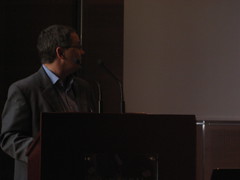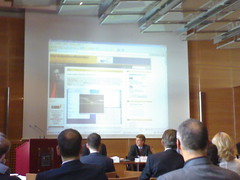Joint Statement of Podcasting Organizations and Podcasters on the Proposed Wipo Treaty for the Protection of Broadcasts and Broadcasting Organizations Presented to 15th Session of Wipo Standing Committee on Copyright and Related Rights:
Bitte unterschreiben:
We, the undersigned individuals and organizations, representing the views of thousands of individuals who create audio and audiovisual podcasts and make them available on the Internet for others to listen to and enjoy, are extremely concerned about the draft World Intellectual Property Organization Treaty for the Protection of Broadcasts and Broadcasting Organizations (the Treaty) and its proposed extension to the Internet.
The rapid adoption of podcasting by groups and individuals, both commercial, semi-professional and non-profit, for political commentary, news reporting, music distribution, and other important information dissemination is testament to its effectiveness. The Treaty proposes to create new rights that are not only unnecessary to sustain novel forms of online communication such as podcasting, but will also inhibit their growth.
The Treaty will stifle innovation in podcasting-related technologies because the Treaty would require signatory countries to provide legal protection for technological protection measures (TPM) and is likely to lead to technology mandate laws controlling the design of broadcast-receiving devices. The Treaty will also inhibit online communication by impeding access to and non-infringing use of copyrighted content. At the same time, where podcasts are made available under a Creative Commons licence, the Treaty could allow subsequent casters to make podcasts available on more restrictive terms, overriding the wishes of the podcast creator.
We oppose the extension of the draft Treaty to the Internet for three reasons.
1. There is no need for the proposed new rights. Webcasting, podcasting, and myriad other forms of online distribution have flourished without the sort of rights this Treaty would grant. Though podcasting is only in its infancy, tens of thousands of podcasts are already being made available, reaching an estimated total audience in the millions. To the extent this Treaty would grant rights to podcasters who also stream their content, including many of the undersigned, we have no desire for such rights.
2. Innovation in podcasting and other new Internet distribution tools will suffer. Podcasting came about because of the widespread adoption of general purpose portable audio players like iPods, as well as use of web syndication technologies like RSS. Had these novel tools been hampered by the secondary liability concerns that the treaty’s overbroad intellectual property rights pose for technology developers and manufacturers of devices that could be used to infringe the new rights, podcasting might never have flourished. This Treaty would hinder innovation in future tools by forcing technology developers to obey government TPM mandates over device design. Along with increasing the potential financial costs for innovators, the TPM mandates will limit the types of features on new devices.
3. Extending the Treaty to the Internet will harm the flow of information and free speech online. Podcasters’ freedom of expression is likely to suffer as a result of reduced innovation. Moreover, the treaty will impede podcasters’ access to and non-infringing use of copyrighted content. Podcasters can currently rely on national copyright laws to lawfully include copyrighted materials in their programs, whether for news reporting, education, or other permitted uses. The proposed Treaty would undermine those uses by layering a new and overbroad set of rights on top of copyright. This will require a second layer of rights clearance for transmitted materials. This will increase transaction costs for podcasters, who already face significant hurdles in obtaining necessary copyright clearances due to undeveloped licensing markets. But it will also give broadcasters the ability to silence podcasters who depend on use of copyrighted materials.
Signed,
United Kingdom Podcasters’ Association (UKPA)
German Podcastverband
U.S. Podcast Guild
Cory Doctorow war so nett unser Anliegen auch auf BoingBoing zu posten



